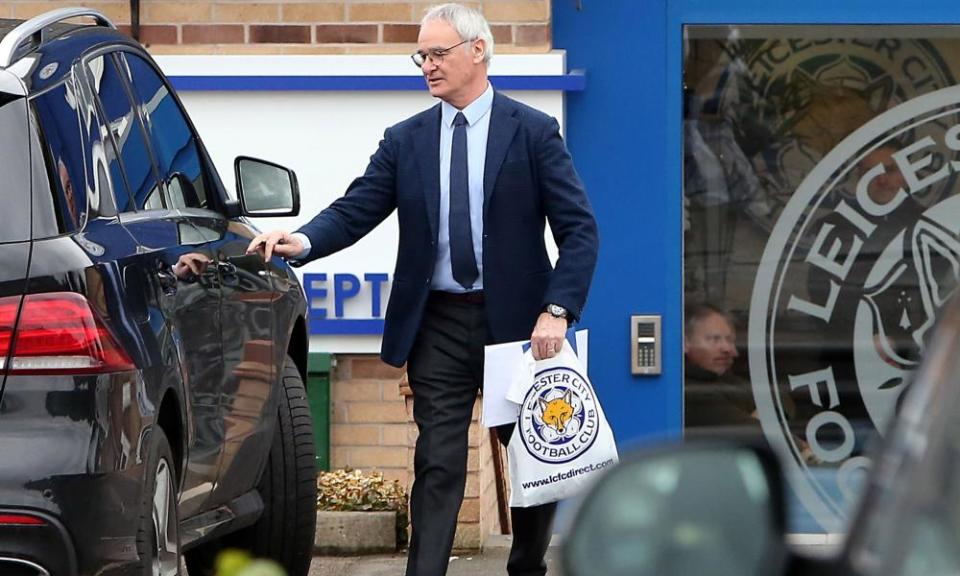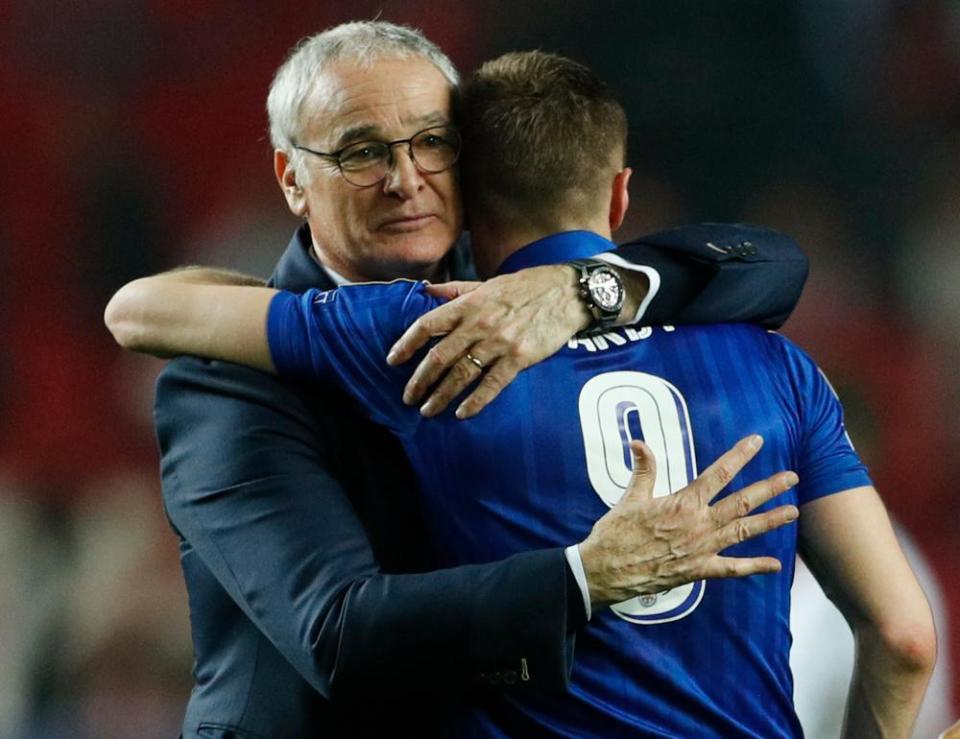Claudio Ranieri’s Leicester exit a tale of deceit and discourtesy | Daniel Taylor

It was the headline in Gazzetta dello Sport that jumped out from the news stands on the morning after the kind of newsflash that made it easy to understand what Gareth Southgate meant when he talked about loving the sport but not necessarily liking it. Claudio Ranieri had become another managerial statistic and it was quickly becoming apparent there were players at Leicester City who would be glad to see the back of him. “Inglesi Ingrati,” was the verdict in capital letters on the front page of Italy’s biggest-selling sports daily.
A touch rich, you might think, in the country where some of the more trigger-happy football club owners are known as mangia-allenatore –translation: manager-eaters – and, strictly speaking, the decision to overthrow Ranieri was taken from Bangkok rather than Braunstone or Beaumont Leys.
Yet this doesn’t really feel like a time to be nitpicking on behalf of the “ungrateful English” when a fine man has lost his job and the vast majority of Leicester’s players have clearly found it too arduous to tap in a few weasel words on the Twitter accounts where they promote their sponsorship deals, their wealth and offer vacuous, stage-managed cliches about all sorts of other trivialities. What did Claudio ever do for them, hey? And oh for the days when footballers worried what their managers were plotting, rather than the other way around.
Funnily enough the decision to remove Ranieri might actually be validated if Roberto Mancini, or whoever comes in next, can lead Leicester away from the relegation quicksands and restore some togetherness among a group of players who, whether we like it or not, had taken on mutinous thoughts towards the last regime.
Mancini always arrives with his charm turned on full-beam. He can also be complex, high-maintenance and a complete prima donna, instructing his sidekick, José, to warm up his clothes with a hairdryer before the manager came in from training at Manchester City. But Mancini has plenty of qualities if he can hold off with the mood swings and, to put it one way, he is the only cross-town manager who seriously worried Sir Alex Ferguson during all his years at Manchester United. Guus Hiddink could also have restorative powers and, if Leicester were to clamber to safety, the criticism would quickly fade.
For now, though, Leicester might have to understand if the rest of the sport has been rubbernecking in their direction and concluded that Ranieri deserved better than to find out his players were colluding behind his back or that the club’s owners, the lousy so-and-sos, did not even have the professional courtesy to break the news themselves.
This is the part of the story that shines a light on football’s deceit and two-facedness almost as much as the fact that barely a fortnight earlier, only two days before deciding they had to cut him free, the people in charge at Leicester promised Ranieri their “unwavering support”. Vichai Srivaddhanaprabha, the club’s chairman, and his son, Aiyawatt, clearly find it easier to employ others to carry out their dirty work. Yet, after everything that has gone before, was it really too much to think they might have afforded Ranieri the common decency of a first-hand explanation?
Perhaps this is just the way the game is heading bearing in mind the winners of last season’s Premier League, FA Cup and League Cup have now all been removed and in Louis van Gaal’s case he still had the spray of champagne on his Wembley suit when the news of his imminent departure from Manchester United was leaked.
The demands of modern football have grown and so has the danger. The close relationships that used to exist between managers and owners are no longer so prevalent now the relevant people might be living on different continents. The money is so extreme nobody wants to be left behind and that, in turn, has bred a culture of fear and impatience. It’s just a fact, it’s unshakeable and anyone who still cares about the game is obliged to live with it.
It can, however, feel deeply unappealing. There was once a time when it would have been inconceivable for a player to go to the board to air his grievances about the manager. These days it is commonplace. Leicester’s players, the poor little snowdrops, sound as if they have been queueing up and, even now, it feels as if they are strategically positioning themselves.
What should we read into the fact that not one player felt it necessary to offer a clipped tribute to Ranieri within 24 hours of his departure. A few have, in fairness, recognised him now, but it doesn’t feel like a coincidence that comes after their policy of omerta started to be questioned. It feels deliberate, pointed and spoilt beyond belief and in the case of Jamie Vardy it doesn’t help that at 9am on Friday the publicity-ravenous clods who have spent almost a year telling us they are going to turn him into a movie had put out a statement claiming they had been “inundated with questions, comments and concerns” – really? – asking whether Ranieri’s dismissal might affect their plans. “It does not,” they announced. Maybe it is time they just got on with making this film rather than milking it any more. Nice touch, though – using a manager’s sacking to get another plug.

Everything put together, no wonder so many people peer into the bubble of modern football through weary, suspicious eyes. Yet let’s not go too overboard about that side of things. Football has always been a hard-faced business and, if a statue of Ranieri does eventually go up, he will be far from the first manager to be commemorated that way who has felt let down, betrayed even, by the club where he was revered.
People tend to forget that Brian Clough’s departure from Nottingham Forest was accelerated by a Sunday People article, using information supplied by one of the club’s directors, revealing details of his drinking and a secret plot to fire the man who won two European Cups.
Bill Shankly was, almost implausibly, banned from Liverpool’s training ground after all those years as manager, marginalised to the point where he felt more welcome at Everton and Manchester United, and Sir Bobby Robson also knew a thing or two about the elastic principles inside football’s boardrooms. “You simply do not sack Bobby Robson,” Freddie Shepherd, Newcastle’s chairman, said in 2004. No prizes for remembering what happened a few days later, with an explanation from Shepherd that “there was no room for sentiment”.
It is easy, therefore, to sympathise with Ranieri now Leicester have reached the same conclusion but, equally, his sacking does have some justification when players have sided against him and the team are straying dangerously close to becoming the first side since Manchester City in 1938 to be relegated the year after winning the league.
That shouldn’t be confused with a lack of gratitude from the top of the club. Of course they are grateful and always will be. Yet managers, like players, can lose form and Ranieri has been unable to stop his team being softened by success. Players who once gave everything have been slowed down by the weight of their own importance. Attitudes have changed. The rot has set in. Those players might be guilty of professional neglect but the bottom line, ultimately, is that it is the manager’s job to ensure that doesn’t happen and nobody is immune when the chilly fingers of relegation are closing round their throats.
Ranieri, at 65, is experienced and streetwise enough to understand the dangers and, though quite a few people seemed to fall for it, that was a shameless piece of theatre from José Mourinho when the Manchester United manager took it upon himself to offer the most unexpected eulogy of the last few days.
Mourinho, to put that into context, has rarely given the impression that he had a great deal of respect for Ranieri before. Indeed, he once talked about his predecessor at Chelsea being nearly 70 – he was 56 at the time – as well as various other gems down the years, referring to Ranieri’s age, trophy count and inferior results. Now he wore Ranieri’s initials on his shirt and blamed Leicester’s players for their treachery, citing “the typical selfishness of others, people thinking about new contracts, leaving, more money, forgetting who helped them to reach a certain level” and then, sure enough, drawing the inevitable comparison with his second spell at Chelsea. He’s clever, José – never forget it. Robert de Niro could not have done it much better.
In fairness Mourinho did make a valid point about Ranieri’s players and the general reaction shows the scale of affection the Italian has accrued on the back of Leicester’s almost implausible success, with his easy charm, avuncular manner and the way, in happier times, he talked of his players being his “babies” and said, yes, they were tears you could see.
Leicester has had a world snooker champion, an X Factor winner, a Glastonbury-headlining band and a secret diary-keeper who is now, rather scarily, 49 and three-quarters. What they had never had, pre-Ranieri, was a title-winning football team and apart from one near-miss in 1963 they had never really been close since finishing runners-up to Sheffield Wednesday in 1929.
That will be Ranieri’s legacy and one day the players who schemed against him, and the owners who lied and hid and barely gave the team a look-in when it came to parading the championship trophy around the pitch, might understand the sadness that comes from knowing this straight-backed, dignified man, with his twinkling eyes and imaginary bell, has not had a happier ending. Inside Gazzetta one correspondent, Alessandra Bocci, summed it up rather neatly. “The prince goes back to being a normal frog again.”

 Yahoo Sport
Yahoo Sport 





































